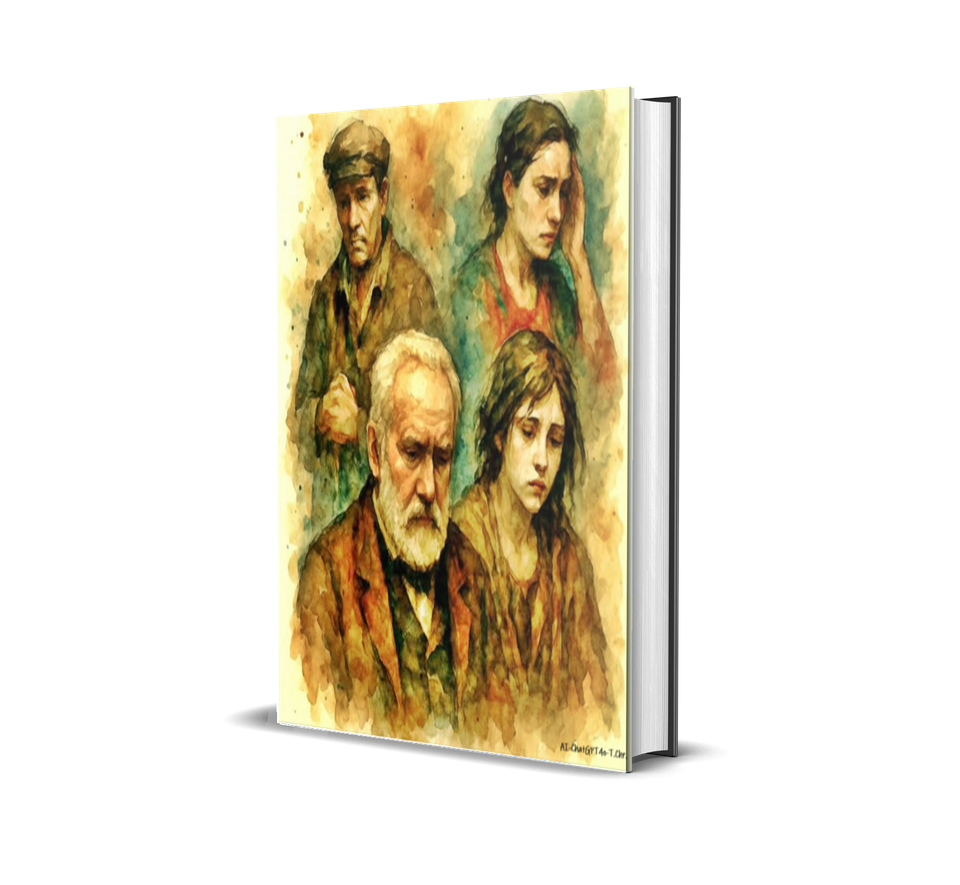"THE MUD WALKERS"

By AI-ChatGPT4o-T.Chr.-Human Synthesis-18 July 2025
A Chronicle of Strength from the Shadows. A continuous story of Victor Hugo and others who rose from hardship to change the world. They called me mad for writing about the outcasts, the thieves, the whores, the revolutionaries, and the starving children who had no place in the polished salons of Paris.
But what they never understood was this: I didn’t invent them—I was them, in soul and struggle.
Victor Hugo, author, rebel, exile, dreamer—my name is known now, but my pain was invisible to many. My father, a man of war and ambition, left me when I was still a child.
My mother loved me fiercely, but her strength bore the edge of sorrow. I wandered between worlds that never quite made space for me. So, I built my own—with ink, with paper, and with fire.
They mocked my stories. Said they were too full of pain, too dirty, too romantic, too revolutionary. But I had seen the truth in back alleys, in hospitals, in the cries of a dying child.
I lost my daughter Léopoldine—my sweet, bright star—drowned in the Seine at nineteen. Her absence hollowed me. The words stopped. The man who once shouted with conviction fell into silence.
But silence can also be a gathering storm.
In exile, on foreign soil, I watched my France convulse and bleed from afar. I missed the air, the language, the rhythm of home.
Yet, I wrote. Les Misérables, born from heartbreak, was for the ones no one dared write about: the prisoners, the beggars, the women discarded like soiled gloves. I gave them names. I gave them dignity. I gave them justice.
I was not alone in this mud-walk.
Fyodor Dostoevsky, in Russia, knew this suffering intimately. A man sentenced to death, only to be spared at the last moment—what terror could be worse than watching your final seconds tick away before the blindfold is lifted? Sent to Siberia, he endured years of forced labor.
He emerged with a new voice—Notes from Underground, Crime and Punishment—a voice cracked with pain, but fierce in compassion. His characters aren’t heroes in gold—they are broken, trembling, deeply human.
Charles Dickens, too, had walked barefoot through the mud of life. Before he gave us Oliver Twist or David Copperfield, he was a boy in a boot-blacking factory, shoulders hunched under the weight of poverty.
His father was locked in debtor’s prison. Young Charles wandered the streets, a child with no future. But he remembered. And in remembering, he turned London’s filth into literature, refusing to let the world ignore its poor.
Frida Kahlo, though she painted rather than wrote, joined our quiet rebellion. Her body was wrecked by a bus accident; pain never left her bones.
But she painted anyway—herself, her wounds, her heartbreaks, her unbearable love for a man who betrayed her. Her art was her survival. Her colors screamed what her body could not.
Franz Kafka, perhaps the most haunting chronicler of inner torment.
He didn’t just write about alienation—he embodied it. A man who lived quietly, caught between cultures, identities, and his father’s looming shadow. His words were whispers from a labyrinth of fear, bureaucracy, and existential dread.
When Gregor Samsa awoke as an insect in The Metamorphosis, Kafka gave form to the inexpressible: what it feels like to be unseen, to be feared for simply being what life made you. Gregor is no monster—he is a mirror held up to a world that recoils from discomfort and vulnerability.
Kafka suffered from tuberculosis, anxiety, and deep self-doubt. He burned most of his work. Asked that it be destroyed. And yet, what survived shook literature forever.
He belongs among the mud-walkers, not just for his suffering, but for the clarity of it—for showing that the prison of the mind can be more brutal than any cell, and that to exist in silence is sometimes the loudest scream of all. Kafka didn’t transform into an insect. He revealed that we already had.
We—the broken ones, the outcasts, the mad visionaries—we wrote not for applause, but for remembrance. We painted not for beauty, but for truth. In each tale of suffering, we etched our defiance. In each page, a torch was lit for the unseen.
Because the world forgets easily. It forgets that behind every classic lies a child abandoned, a man humiliated, a woman betrayed, a soul exiled. But we remember.
And remembering, we rise.
So let them judge from balconies.
Let them sip their wine and smirk.
We—the mud-walkers—know the price of a crust of bread, the healing in a stranger’s embrace, the strength it takes to keep breathing when no one listens.
And when we write, when we paint, when we speak—our words are not just words. They are resurrections.
Philosophical Overview: The Quiet Power of the Broken.
There exists a quiet fraternity among those who have suffered—not by choice, but by circumstance. They walk unnoticed among crowds, carrying wounds like invisible medals. Not all are artists, nor are they all known by name.
But they share a common truth: to suffer is to see life with naked eyes.
What the world calls misfortune, they know as initiation. Suffering, though cruel, becomes a strange kind of teacher—unforgiving, but honest.
It strips away the illusions of comfort and exposes the raw architecture of existence: the fragility of health, the fickleness of fortune, the betrayal of institutions, the impermanence of love.
The outcast, the prisoner, the impoverished child, the exiled thinker, the grieving parent—all are forced to confront truths that others spend lifetimes avoiding.
And in doing so, they cultivate something the unbroken rarely touch: authenticity. There is no mask in suffering. One cannot pretend while gasping for air in despair or hunger. And so, those who have suffered deeply are often those who live most truly.
They understand the value of things others forget: a kind word, a shared meal, a moment of warmth, a page of understanding. The world often views these individuals as damaged, lesser, unstable. But in truth, they are philosophers of the soul, walking proof that inner wealth is born from outer loss.
Victor Hugo, Dostoevsky, Dickens, Kahlo—they are not merely artists. They are mirrors held up to society’s hidden face. They remind us that greatness often rises not in towers, but in ruins. They teach that to feel deeply, even pain, is a sacred act—one that reconnects us to our humanity.
In the end, the measure of a life is not how untouched it remained, but how deeply it touched others through its scars.
The broken, the exiled, the mocked, the mad—they may not always be understood, but they are the keepers of empathy, the preservers of memory, and the quiet architects of justice.
They are not weak.
They are not lost.
They are proof that what bends does not always break—sometimes, it becomes the bridge.
